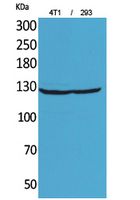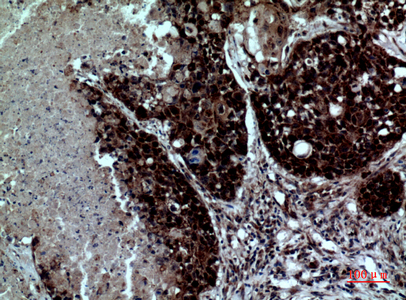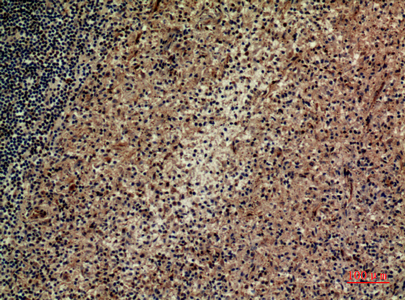


| WB | 咨询技术 | Human,Mouse,Rat |
| IF | 咨询技术 | Human,Mouse,Rat |
| IHC | 1/50-1/100 | Human,Mouse,Rat |
| ICC | 技术咨询 | Human,Mouse,Rat |
| FCM | 咨询技术 | Human,Mouse,Rat |
| Elisa | 1/10000 | Human,Mouse,Rat |
| Aliases | ITGAD; Integrin alpha-D; ADB2; CD11 antigen-like family member D; Leukointegrin alpha D; CD11d |
| Entrez GeneID | 3681 |
| WB Predicted band size | Calculated MW: 127 kDa; Observed MW: 127 kDa |
| Host/Isotype | Rabbit IgG |
| Antibody Type | Primary antibody |
| Storage | Store at 4°C short term. Aliquot and store at -20°C long term. Avoid freeze/thaw cycles. |
| Species Reactivity | Human |
| Immunogen | The antiserum was produced against synthesized peptide derived from the Internal region of human ITGAD. AA range:901-950 |
| Formulation | Purified antibody in PBS with 0.05% sodium azide,0.5%BSA and 50% glycerol. |
+ +
以下是3-4篇关于Integrin alpha 4(α4)抗体的代表性文献及其摘要概括:
---
1. **文献名称**:*Natalizumab: alpha 4-integrin antagonist selective adhesion molecule inhibitors for MS*
**作者**:Miller, D.H., et al.
**摘要**:该综述总结了抗α4整合素单抗natalizumab(那昔妥单抗)的机制及临床效果,强调其通过阻断α4β1整合素与血管细胞黏附分子(VCAM-1)的相互作用,抑制免疫细胞穿越血脑屏障,从而降低多发性硬化症(MS)的复发率。
---
2. **文献名称**:*The α4β1 integrin in immune cell trafficking: implications for inflammation and therapeutic targeting*
**作者**:Yousefi, S., et al.
**摘要**:本文探讨了α4β1整合素在炎症性疾病(如类风湿性关节炎和炎症性肠病)中调节免疫细胞迁移的作用,并讨论了靶向α4抗体(如vedolizumab)的治疗潜力及潜在副作用(如机会性感染风险)。
---
3. **文献名称**:*Blockade of α4 integrins inhibits leukocyte recruitment and mitigates lethal endotoxic shock*
**作者**:Bullard, D.C., et al.
**摘要**:通过动物模型研究,该文献证明抗α4整合素抗体可显著抑制中性粒细胞和单核细胞向炎症部位聚集,减轻内毒素诱导的全身性炎症反应,为脓毒症等重症炎症的治疗提供了实验依据。
---
4. **文献名称**:*Targeting α4 integrins in cancer immunotherapy and tumor angiogenesis*
**作者**:Yang, C., et al.
**摘要**:该研究提出α4整合素在肿瘤微环境中促进血管生成和免疫逃逸,使用特异性α4抗体可抑制肿瘤生长并增强T细胞浸润,为癌症联合免疫治疗提供了新策略。
---
以上文献覆盖了Integrin α4抗体在自身免疫病、炎症和肿瘤治疗中的机制与应用。如需具体文献来源(期刊卷号、页码),建议通过PubMed或Web of Science进一步检索。
Integrin alpha 4 (α4) is a transmembrane glycoprotein that pairs with β1 or β7 subunits to form heterodimeric receptors (α4β1. α4β7) involved in cell adhesion, migration, and signaling. These integrins bind to ligands such as vascular cell adhesion molecule-1 (VCAM-1) and mucosal addressin cell adhesion molecule-1 (MAdCAM-1), facilitating leukocyte trafficking to inflamed or injured tissues. The α4 subunit plays critical roles in immune responses, inflammation, and cancer metastasis by mediating cell-cell and cell-extracellular matrix interactions.
Antibodies targeting integrin α4 (e.g., natalizumab) are therapeutic agents designed to block these interactions. Natalizumab, a humanized monoclonal antibody, inhibits α4β1/α7-mediated leukocyte adhesion, reducing immune cell infiltration into tissues. It is clinically used to treat multiple sclerosis and Crohn’s disease by suppressing chronic inflammation. However, long-term use may increase the risk of progressive multifocal leukoencephalopathy (PML) due to immunosuppression. Research also explores α4 antibodies in cancer therapy, aiming to disrupt tumor cell adhesion and metastasis. Despite therapeutic benefits, challenges remain in balancing efficacy with immune-related side effects. Studies continue to refine antibody specificity and develop next-generation agents with improved safety profiles.
×